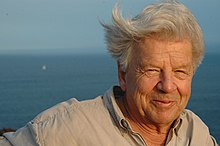You can help expand this article with text translated from the corresponding article in German. (November 2015) Click for important translation instructions.
|
| Irenäus Eibl-Eibesfeldt | |
|---|---|
 | |
| Born | (1928-06-15)15 June 1928 Vienna, First Austrian Republic |
| Died | 2 June 2018(2018-06-02) (aged 89) Starnberg, Germany |
| Nationality | Austrian |
| Alma mater | Ludwig Maximilian University of Munich |
| Scientific career | |
| Fields | Ethology |
| Institutions | University of Vienna |
Irenäus Eibl-Eibesfeldt (German pronunciation: [irɛˈnɛːʊs ˌaɪ̯bl̩ʔˈaɪ̯bəsfɛlt] ; 15 June 1928 – 2 June 2018) was an Austrian ethologist in the field of human ethology. In authoring the book which bears that title, he applied ethology to humans by studying them in a perspective more common to volumes studying animal behavior.
Education and work
Born in Vienna, Austria, Eibl-Eibesfeldt studied zoology at the University of Vienna from 1945 to 1949. From 1946 to 1948 he was research associate at the Biological Station Wilhelminenberg near Vienna and became a research associate of the Institute for Comparative Behavior Studies in Altenberg near Vienna with Konrad Lorenz in 1949. Between 1951 and 1969 he worked at the Max Planck Institute for Behavioral Physiology (first in Westphalia, from 1957 at Seewiesen, Bavaria). In 1970 he became Professor for Zoology at the University of Munich. From 1975 he was the head of the Max Planck Institute for Behavioral Physiology, Department of Human Ethology in Andechs, Germany. He was the co-founder and first president of the International Society for Human Ethology. From 1992 he was Honorary Director of the Ludwig-Boltzmann-Institute for Urban Ethology in Vienna.
In the first 20 years of his work as an animal ethologist, he investigated experimentally and descriptively the development of behavior of mammals and compared the behavior of communication of vertebrates. He was the author of many books such as Love and Hate: The Natural History of Behavior Patterns and Human Ethology.
Personal life
He married Eleonore Eibl-Eibesfeldt in 1950. They had two children, Bernolf and Roswitha.
Eibl-Eibesfeldt died on 2 June 2018 in Starnberg, at age 89.
For many years he dived with Hans Hass on his diving boat Xarifa.
Decorations and awards
- 1971 Gold Medal of the cosmos Bölsche Society for Services to the dissemination of scientific knowledge
- 1981 Burda Prize for Communication Research
- 1988 Philip Morris Research Prize
- 1989 Gold Honorary Medal of Vienna
- 1994 Honorary Doctorate of Philosophy at the University of Salamanca, Spain
- 1995 Great Cross of Merit of the Federal Republic of Germany
- 1996 National Park bubble in gold with rubies and diamonds for exceptional service to the international nature protection conferred by the Natural History Museum of Vienna and the Danube-Auen National Park Academy
- 1996 Schwenk'scher Environmental Award of Ebersberg
- 1997 Gold Medal of the Drs Haackert Foundation, awarded for outstanding contributions to the study of human behaviour
- 1997 Bavarian Order of Merit
- 1997 years prize of the Foundation for Western consciousness (STAB) from Zurich
- 1998 Austrian Cross of Honour for Science and Art, 1st class
- 1998 Inge and Werner Grüter Award for successful science communication for services to the marine biology and Riffforschung
- 1999 "Premio Catedra Santiago Grisolía" for contributions to the study of the ethology of the people and the aggressiveness
- 1999 "Al mérito" awarded by the Charles Darwin Foundation, Ecuador
- 2001 Honorary award from the Heinz Foundation Sielmann for use for conservation, especially in the Galapagos Islands
- 2003 Gold Medal for services to the City of Vienna
- 2005 Honorary Doctorate of Psychology at the University of Bologna, Italy
See also
References
- ^ "Irenäus Eibl-Eibesfeldt gestorben". news.ORF.at (in German). 2018-06-02. Retrieved 2018-06-02.
- "ZEIT ONLINE | Lesen Sie zeit.de mit Werbung oder im PUR-Abo. Sie haben die Wahl". Die Zeit. 3 June 2018.
- Archived July 27, 2009, at the Wayback Machine
- "Reply to a parliamentary question" (PDF) (in German). p. 1076. Retrieved 19 December 2012.
External links
- Eibl-Eibesfeldt's homepage
- Biography
- International Society for Human Ethology
- Homepage of lecture for Human Ethology at the University Innsbruck several PDF-documents in English
- 1928 births
- 2018 deaths
- Austrian underwater divers
- Austrian zoologists
- Commanders Crosses of the Order of Merit of the Federal Republic of Germany
- Recipients of the Austrian Cross of Honour for Science and Art, 1st class
- Ethologists
- Academic staff of the Ludwig Maximilian University of Munich
- Scientists from Vienna
- University of Vienna alumni
- Members of the European Academy of Sciences and Arts
- Max Planck Institute directors